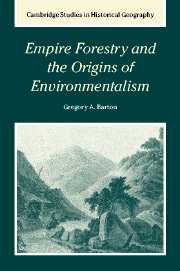Book contents
- Frontmatter
- Contents
- List of illustrations
- Acknowledgments
- 1 Introduction
- 2 The great interference
- 3 Empire forestry and British India
- 4 Environmental innovation in British India
- 5 Empire forestry and the colonies
- 6 Empire forestry and American environmentalism
- 7 From empire forestry to Commonwealth forestry
- Bibliography
- Index
- Cambridge Studies in Historical Geography
2 - The great interference
Published online by Cambridge University Press: 13 July 2009
- Frontmatter
- Contents
- List of illustrations
- Acknowledgments
- 1 Introduction
- 2 The great interference
- 3 Empire forestry and British India
- 4 Environmental innovation in British India
- 5 Empire forestry and the colonies
- 6 Empire forestry and American environmentalism
- 7 From empire forestry to Commonwealth forestry
- Bibliography
- Index
- Cambridge Studies in Historical Geography
Summary
Environmentalist thought before the 1960s revolved around forests and their preservation. For instance, it was only in the 1980s that the journal Forest and Conservation History (founded 1957) began broadening the concept of environmental history beyond forest issues alone; the publication is now called the Journal of Environmental History. Early advocacy for preservation focused on forest land for a number of reasons. Timber supply and revenue questions always demanded the attention of governments. But climate theories that explained how forest lands affected rainfall, along with soil preservation, water flow, animal life, and the preservation of a variety of forest flora and fauna made forestry the most pressing environmental issue of the late nineteenth and early twentieth centuries.
Empire foresters usually understood the broader implications of their work, and the effect of forestry practice on the environment. In 1872 Baden Powell admonished his officers at the first India-wide forestry conference to “regard the planting and restoration of our divisions as your chief business.” “Never,” he instructed “consent to work as if the felling of timber was the great work of life, and as if the provision of a few rupees in the Budget under the planting head … was all that is needed by way of supplement.”
Defined broadly, environmentalism means merely the advocacy of a proper balance between humans and the natural world. Certainly a history of modern environmentalism is a history of the relationship of people with their environment, particularly the history of advocacy and preservation.
- Type
- Chapter
- Information
- Empire Forestry and the Origins of Environmentalism , pp. 9 - 37Publisher: Cambridge University PressPrint publication year: 2002

